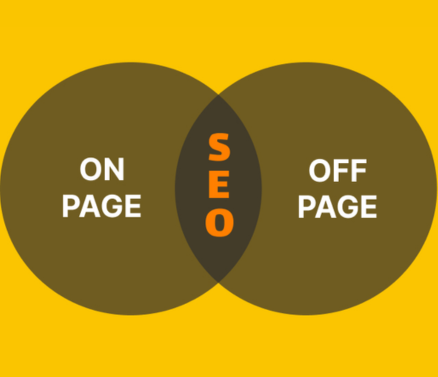
On-Page and Off-Page SEO: Understanding the Difference
Content
- 1. Introduction
- 2. What is On-Page SEO?
- 3. What is Off-Page SEO?
- 4. Key Differences Between On-Page and Off-Page SEO
- 5. How On-Page and Off-Page SEO Work Together
- 6. Conclusion
1. Introduction
Search Engine Optimization (SEO) is a critical component of digital marketing that focuses on improving a website's visibility in search engine result pages (SERPs). By optimizing various aspects of a website, businesses can increase their organic traffic, attract more potential customers, and boost their online presence. SEO is broadly divided into two categories: On-Page SEO and Off-Page SEO.On-Page SEO involves optimizing elements within the website itself, such as content, HTML source code, and overall site architecture. In contrast, Off-Page SEO encompasses activities conducted outside the website, primarily focusing on building backlinks and enhancing social signals to improve the site's authority and ranking. Understanding the differences and the complementary nature of these two SEO types is essential for developing a robust and effective SEO strategy that can lead to higher search engine rankings and increased website traffic.
2. What is On-Page SEO?
On-Page SEO refers to the practice of optimizing individual web pages to rank higher and earn more relevant traffic in search engines. This involves various elements within your website, including content, HTML source code, and site architecture. The goal is to make your site more understandable and accessible to search engines, improving its relevance and user experience. Key components of On-Page SEO include title tags, meta descriptions, header tags, URL structure, internal linking, and content optimization. By fine-tuning these elements, you ensure that search engines can efficiently crawl and index your site, making it easier for users to find your content. On-Page SEO is essential because it gives you direct control over your website's elements, allowing you to create a solid foundation for your overall SEO strategy
3. What is Off-Page SEO?
Off-Page SEO refers to all the activities performed outside the boundaries of your website to improve its search engine rankings. The primary focus of Off-Page SEO is building high-quality backlinks from other reputable websites, which signal to search engines that your site is credible and authoritative. Additionally, Off-Page SEO involves social signals, such as likes, shares, and comments on social media platforms, which can drive traffic to your site and enhance its online presence. Guest blogging is another crucial aspect of Off-Page SEO, where writing articles for other websites can help you gain exposure and backlinks. These external factors collectively contribute to the perceived trustworthiness and relevance of your website, playing a significant role in how search engines rank your content. By effectively leveraging Off-Page SEO strategies, you can enhance your site's authority and visibility, ultimately leading to higher search engine rankings and increased organic traffic.
4. Key Differences Between On-Page and Off-Page SEO
On-Page SEO and Off-Page SEO are two fundamental aspects of search engine optimization that serve distinct purposes but work together to enhance a website's visibility. On-Page SEO focuses on optimizing elements within your own website, such as content, meta tags, and internal linking. It deals with how well your website is structured and how relevant your content is to the keywords you're targeting. On the other hand, Off-Page SEO involves actions taken outside your website to improve its search engine rankings. This primarily includes acquiring backlinks from other reputable sites, engaging in social media, and other external activities that build your site's authority and credibility. While On-Page SEO helps search engines understand your site's content and relevance, Off-Page SEO influences how your site is perceived by others on the web. Both are crucial; On-Page SEO ensures your site is optimized internally, while Off-Page SEO enhances your site's authority and reach through external factors.
5. How On-Page and Off-Page SEO Work Together
On-Page and Off-Page SEO are interdependent elements of a comprehensive SEO strategy, each enhancing the effectiveness of the other. On-Page SEO ensures that your website is well-structured and optimized internally. This includes creating high-quality content, using appropriate keywords, and optimizing meta tags and site architecture. These efforts help search engines understand your site’s relevance and improve its visibility in search results. Meanwhile, Off-Page SEO builds on this foundation by driving external signals of authority and trust to your site, primarily through backlinks from reputable sources and social media engagement. When Off-Page SEO efforts lead to high-quality backlinks and increased social signals, it boosts the credibility of your site, which in turn helps reinforce the internal optimizations made through On-Page SEO. Essentially, while On-Page SEO makes your site appealing to search engines and users, Off-Page SEO leverages external factors to validate and amplify that appeal. Together, they create a synergistic effect that improves overall search engine rankings and enhances the site's ability to attract and retain organic traffic.
6. Conclusion
In summary, both On-Page and Off-Page SEO are integral components of a successful search engine optimization strategy. On-Page SEO involves optimizing elements within your website to make it more accessible and relevant to search engines and users, which includes improving content, meta tags, and site structure. Conversely, Off-Page SEO focuses on building external signals of authority and trust through activities like acquiring backlinks and boosting social media engagement. While On-Page SEO creates a solid foundation by enhancing the internal aspects of your website, Off-Page SEO helps establish and amplify your site's credibility in the broader web ecosystem. Combining these two approaches effectively can significantly enhance your website's search engine rankings, drive more organic traffic, and ultimately achieve better visibility and engagement online.
Subcribe to our Newsletter
Far far away, behind the word mountains, far from the countries Vokalia and Consonantia, there live the blind texts. Separated they live in
Leave a comment